Abstract
Purpose
This study was to explore and describe the reported experiences of elderly spouses who care their bedridden spouse in the home.
Methods
The participants of this study were 14 male and female elderly spouses who live in B metropolitan city and have provided care for more than six months. Data were collected from July 3 to November 6, 2014. Data analysis was done simultaneously with data collection, using the analytical methods of Strauss and Corbin for Grounded theory.
Results
The core category was identified as ‘going together bearing a heavy burden of care in old age.’ In this study, the caring process of elderly spouses can be explained in terms of three stages such as ‘a period of trial and error,’ ‘a period of mastering a role,’ and ‘a period of role transcendence’.
Go to : 
REFERENCES
1.Korea insurance research institute. The 3.8 times increasement of geriatric disease medical expense for last six years. KIRI Weekly. 2010 February 8. 14.
2.Statistics Korea. The survey on the actual conditions of older person in Korea [Internet]. Seoul: Statistics Korea;2016. [cited 2016 November 18]. Available from:. http://kosis.kr/statHtml/statHtml.do?orgId=117&tblId=DT_11771_2011N055&conn_path=I2.
3.Baik OM. Factors associated with functional health outcomes in community-dwelling older adults. Journal of Community Welfare. 2011. 38:1–27.
4.Kim EJ. Factors influencing cognitive impairment of the elderly residents. Journal of East-West Nursing Research. 2010. 16(2):122–30.
5.Ree KO., Lee MJ. A study on caregiving burden among family caregivers of impaired elderly. Journal of Korean Gerontological Society. 2000. 20(2):215–28.
6.Han SJ. Factors influencing quality of life of home care patient's primary caregiver. Journal of Korean Academic Society of Home Care Nursing. 2010. 17(2):144–55.
7.Baek HC., Choi YJ. Identifying the needs of home care patient's family caregivers. Journal of Korean Academic Society of Home Care Nursing. 2008. 15(2):115–21.
8.Given B., Stommel M., Collins C., King S., Given CW. Responses of elderly spouse caregivers. Research in Nursing & Health. 1990. 13(2):77–85.

9.Thommessen B., Aarsland D., Braekhus A., Oksengaard AR., En-gedal K., Laake K. The psychosocial burden on spouses of the elderly with stroke, dementia and Parkinson's disease. International Journal of Geriatric Psychiatry. 2002. 17(1):78–84. https://doi.org/10.1002/gps.524.

10.Lee SM., Kim HK. Elderly husbands' caregiving for their sick wives: narratives of husbands and wives. Family and Culture. 2009. 21(4):63–94.
11.Eun Y., Choi KS., Kim SJ. A Study on burden of older spouses of patients with chronic illness. Journal of Korean Gerontological Nursing. 1999. 1(2):160–71.
12.Han JH., Park YH. Caregiver's burden and quality of life of male spouses with stroke wives. Korean Journal of Adult Nursing. 2012. 24(6):615–26.

13.Jeon SN. A grounded theory on the caregiving experiences for the rural elderly males who caring for their wives of stroke patients. Journal of Korean Gerontological Society. 2007. 16:105–28.
14.Choi HK. A ground theory study on elderly male caregivers of spouses: focused on the structure and types of care. Family and Culture. 2012. 24(4):45–81.
15.Gregory DM., Peters N., Cameron CF. Elderly male spouses as caregivers: toward an understanding of their experience. Journal of Gerontological Nursing. 1990. 16(3):20–4.

16.Medina MV., Haltiwanger EP., Funk KP. The experience of chronically ill elderly Mexican-American men with spouses as care-givers. Physical & Occupational Therapy in Geriatrics. 2011. 29(3):189–201. https://doi.org/10.3109/02703181.2011.587636.

17.Jang HY. Hermeneutic phenomenological study on caring experience of the spouses of elderly people with dementia. [dissertation]. Seoul: Seoul National University;2014.
18.Kim NY. A study on long-term care financing and providers in the United States and its policy implications. Health and Welfare Policy Forum. 2010. 168(10):45–56. http://repository.kihasa.re.kr:8080/handle/201002/4343.
19.Strauss AL., Corbin JM. Basics of qualitative research: techniques and procedures for developing grounded theory. Thousand Oaks, CA: Sage Publications;1998.
20.Lincoln YS., Guba EG. Naturalistic Inquiry. Newbury Park, CA: Sage Publications;1985.
21.Han GH., Lee SY. The effect of motivation and social support on burden of spouse caregivers: focused on gender differences. Journal of Korean Gerontological Society. 2009. 29(2):683–99.
22.Kim SY. The experience of primary caregivers of bed ridden patients receiving home health care service. [dissertation]. Seoul: Hanyang University;2013.
23.Lee HA. Caregiver burden in caring for elders before and after long-term care service in Korea. Journal of Korean Academy of Nursing. 2012. 42(2):236–47.

24.Lee JW., Lee HA., Hwang JH. Awareness of Korean elderly on aged life. Journal of Korean Gerontological Society. 2011. 31(3):711–32.
25.Chung MS. Factors affecting quality of life in the elderly. Journal of Welfare for the Aged. 2007. 37:249–73.
26.Song IS., Yoo EK. A study on the stress of the family caregiver caring the elderly hospitalized by chronic illness. Hanyang Journal of Medicine. 1998. 18(2):187–96.
27.Kim TS., Seo SN. A qualitative approach of the elderly's lives through the life history research: focused on the elderly who lived home. Journal of Welfare for the Aged. 2012. 53:291–318.
28.Choi KS. Eun Y. A theory construction on the care experience for spouses of patients with chronic illness. Journal of Korean Academy of Nursing. 2000. 30(1):122–36.
Go to : 
 | Figure 1.Theoretical framework for going together bearing a heavy burden of care in old age. |
Table 1.
Relationships among Categories using Paradigm Model




 PDF
PDF ePub
ePub Citation
Citation Print
Print


 XML Download
XML Download